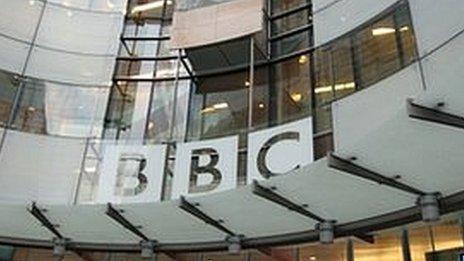Lord Patten to stand down from BBC for health reasons
- Published
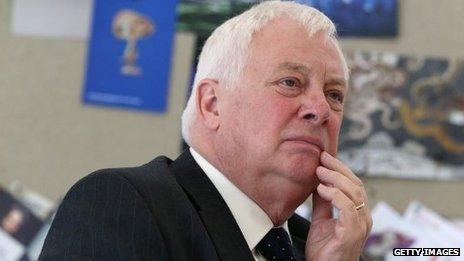
Lord Patten's term as BBC Trust chairman was due to end in April 2015
BBC Trust chairman Lord Patten has announced he will be standing down with immediate effect on health grounds following major heart surgery.
Appointed in 2011, he had a turbulent tenure, including the Savile crisis and the row over senior staff pay-offs.
In a statement, Lord Patten said he had been admitted to hospital with chest pains on 27 April and had successful heart surgery the following day.
Doctors have advised him he "cannot continue to work at the same pace".
"On this basis I have decided with great regret to step down from much the most demanding of my roles - that of chairman of the BBC Trust," he said.
"This is a position that requires and has received from me 100% commitment and has been my priority at all times."
As BBC Trust chairman, Lord Patten earned a salary of £110,000 for working three to four days a week. His term was due to end in April 2015, after four years in post.
However, he had admitted the timing was "not ideal" - with both a general election and negotiations over the renewal of the BBC's Royal Charter looming.
Indeed, Lord Patten was previously believed to have floated the idea of extending his term in order to avoid the process of appointing a successor - which is handled by the government of the day - becoming politicised.
'Not perfect'
Lord Patten, who will be 70 next week, has had a varied career, including senior roles in the Conservative Party, the chancellorship of Oxford University, the governorship of Hong Kong and a seat in the House of Lords.
He said of his decision to stand down from the BBC: "It would not be fair to my family to continue as before; and equally it would not be fair to the BBC and those it serves not to be able to give that commitment which the role demands."
He said it had been "a privilege" to have served as chairman of the BBC Trust but added that "it is not perfect - what institution is?"
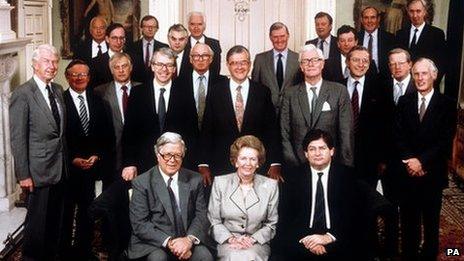
Chris Patten [third from left, middle row] was a member of the 1989 Tory Cabinet
Media commentator Steve Hewlett said Lord Patten would be "the first to agree" his chairmanship "hadn't gone as well as he would have hoped".
Lord Patten appointed George Entwistle as the BBC's director general - only to see him quit 54 days later in the wake of the Jimmy Savile scandal.
He also had to appear in front of MPs to explain why the BBC had written off £100m of licence-payers' money on an ambitious but doomed IT project - even though the scheme pre-dated his tenure.
Most embarrassingly, he became embroiled in a public spat with former BBC director general Mark Thompson over who knew what, and when, about the BBC over-paying its senior staff.
'Staunch believer'
In his statement, Lord Patten said he would "be making no further statement whatsoever about the BBC or my period as chairman of the BBC Trust" for the time being.
However, he added that he hoped to "say more on the future of the BBC" at Charter Review time.
The BBC's royal charter, which sets out the corporation's purposes and the way it is run, is reviewed every 10 years. The current charter runs until the end of 2016.
Lord Patten's family has requested that their privacy is respected while he recovers.
Vice-chairman Diane Coyle will take over as acting chairman of the BBC Trust until a successor is appointed.
BBC director general Tony Hall said: "I have enjoyed working with Chris over the last year; he is a staunch believer in the BBC and he has brought his vast experience to the role of chairman.
"He has steered the BBC through some of its most difficult days. In undertaking this role he brought unrivalled experience, wisdom, and an overwhelming desire to ensure that the BBC remains the best public service broadcaster in the world."
Culture Secretary Sajid Javid said in a letter to Lord Patten that he had "embraced the challenges that have confronted the BBC" and "shown an unfettered personal commitment to securing the best outcome for the public".
Shadow Culture Secretary Harriet Harman said: "Lord Patten became trust chair at a difficult time in its history and helped the BBC to turn a corner under new leadership with Tony Hall."
- Published6 May 2014
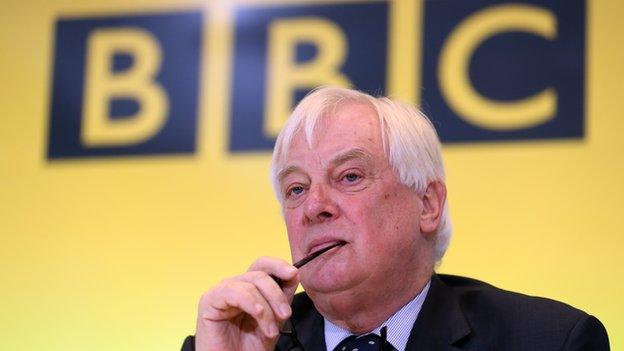
- Published23 September 2013
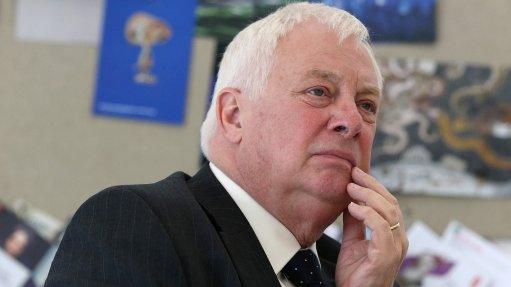
- Published10 July 2013
